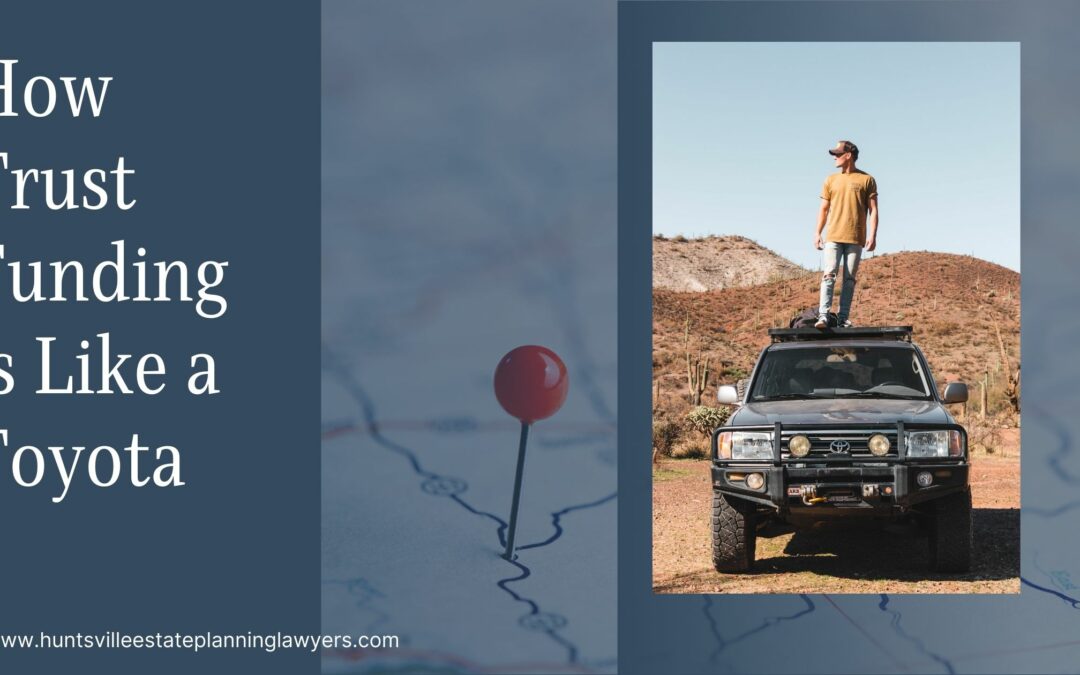If you have a trust as part of your estate plan, is it funded? If you said, “Huh?” to that question, scratched your head, or answered with a “Didn’t my lawyer do it?”, you must continue reading! What does it mean to fund a trust? How do you fund a trust? I get these questions a lot, and I think there’s a lot of misunderstanding about trusts and funding the trust. You may have a trust as part of your estate plan, but unless it’s funded, it doesn’t help a whole lot. Incredibly, trust funding is a like a Toyota, it’s a vehicle that needs parts and a way to get you to your destination.
I have learned over the years that revocable or “living” trusts are great estate planning tools. There are so many great benefits that most of my clients opt to create a trust to make managing and transferring their assets after they are gone much easier for their families. However, a trust is only as good as the assets you put in it. That is, a trust only manages and controls the assets you put in while you are alive, by transfer through your will or as a payable-on-death beneficiary.
Isn’t Signing the Trust Document Enough?
Many believe that once you sign the trust document, that’s all you must do. Unfortunately, that’s not the case. The trust document is the important first step but not the only step in reaching your estate planning goals using a trust. Merely signing the trust document creates the vehicle to reach your destination. That vehicle needs fuel.
How a Trust is Like a Toyota
In January 2024, I had the opportunity to tour the Mazda Toyota Manufacturing Facility in Huntsville, Alabama. What an amazing experience! I saw how the Toyota Corolla Cross and the Mazda CX-50 are made from start to finish. The Toyotas are on one line, and the Mazdas are on another. Each Toyota or Mazda starts with the same basic frame for the respective vehicle. That basic frame then goes slowly through a long and winding assembly line, with dedicated workers adding the required components common to every Toyota or Mazda on the road, such as the wiring, windows, doors, and all the other common components that make that vehicle function as required and desired.
Those vehicles going through the assembly line will also have special features added; the vehicles will be painted in different colors, some will have sunroofs while others do not, and other features will be added throughout the assembly process based on the orders from the dealerships. At the end of the assembly line, with all the variations in addition to the same basic components, the vehicle is inspected, tested, and then loaded onto a truck or train car to ship to a dealership.
No matter how well built that Mazda or Toyota is, nor how many special features it has, it won’t go anywhere without the fuel. A vehicle needs fuel to reach its destination.
Fuel Your Trust
Your trust is like that of the Toyota Corolla Cross. Many trusts have the same standard components to make a legally binding document to function the way a trust must function. However, goals and needs vary from trust to trust, so special features will be added along the way. Like that Toyota needs fuel to get you to your destination, so does your trust. Funding your trust is that fuel. Your estate planning attorney can create a beautifully worded trust that does exactly what you want it to do. Still, that trust won’t reach its destination if you don’t put the fuel in it.
That means you must put assets in your trust. Your lawyer may assist you with some of this, but it’s ultimately up to you to ensure it’s funded with the assets you want it to transfer upon your death.
Fund Your Trust
What does funding your trust mean? Suppose you want your trustee to sell your house and divide the proceeds after you die. You must place the house in the trust. That requires a deed to sign that conveys your interest in the property to the trust so that the property is titled in the name of the trust. You may want to name your trust as a primary or contingent death beneficiary of your bank or other financial accounts. You can assign personal property to the trust by signing an “assignment of personal property.”
You can do several things to fund your trust, but all require action on your part. Talk with your estate planning attorney about how to do those things. Talk to your financial advisor, who can help you change beneficiary designations.
Next Step
Understand and know that your trust must be funded to be effective. If you aren’t sure whether your trust is funded, check the titles of your real property, check the beneficiary designations on your accounts, and talk with your financial planner and your estate planning lawyer. Find out what next steps you must take to fund your trust to ensure your estate plan takes care of your family as you designed it to do.
If you have any questions about your estate planning, call me at (256) 361-1221. If you need to have your estate plan prepared, you can reach me at that number, or you can go to Huntsville Estate Planning Lawyer, LLC online and schedule an appointment directly from there.






